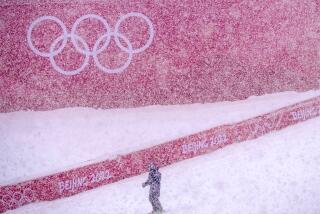No Doubt, Austria Is Serious
- Share via
If you don’t think the vaunted Austrian men’s Alpine team was embarrassed by its two-medal performance at Lillehammer, and is hell-bent not to end up with strudel on its face again at the upcoming Nagano Olympics, check out last week’s amazing occurrence:
Hermann Maier, the 25-year-old bricklayer who has dominated the World Cup circuit this year, did not race the famed Hahnenkamm downhill at Kitzbuehel, Austria, reportedly because coaches wanted him to rest up for Nagano.
For an Austrian team that has often pooh-poohed the importance of the Olympics in the overall scheme of world greatness, this was akin to holding a player out of the Super Bowl to save him for the Pro Bowl.
“That’s incredible,” Alan Ashley, U.S. Ski and Snowboard Assn. vice president of athletics, said. “If you ask any downhill racer, they’ll tell you Kitzbuehel is absolutely the biggest thing in the world.”
Organizers for the event were outraged that Austria would withhold its star racer for the world’s premier Alpine skiing event. The Austrians’ spin? They said Maier was recovering from injured shinbones.
In initial reports, however, there was no mention of Maier’s shins. In fact, Austrian Coach Werner Margreiter told Reuters that a break was necessary because “the Olympics have to be given priority.”
Revenge for Lillehammer?
You bet.
Imagine the consternation in 1994 when Tommy Moe, the unheralded American, single-handedly outperformed the Austrian men in a sport that is all but a religion in their country.
Moe, of course, won the Olympic gold in downhill and a silver medal in the super-giant slalom. The Austrian men dangled a single gold, Thomas Stangassinger’s in slalom, and Christian Mayer’s bronze in giant slalom.
Holding Maier out of Kitzbuehel is a clear indication the Austrians have no intention of letting the United States, or any other country, snatch the world stage that is rightly theirs.
And if Austria plays it right, it could make a mockery of the men’s Alpine competition at Nagano. Maier, who has risen from obscurity to become the best all-around skier in the world, could medal in all four Olympic events--downhill, super-G, giant slalom and slalom.
The Austrians have already won a record 20 World Cup races this season and own five of the top seven individual spots in the overall rankings.
One explanation for Austrian Olympic meltdowns is that merely making the home country team is a chore in itself.
The qualifying process within the team is fierce and ruthless, with only four skiers allowed to race in each event.
“They just set the standards so very high,” Ashley said. “If you can’t rise to them, there’s somebody right there to do it.”
In 1980, for example, defending Olympic champion and legendary Austrian downhiller Franz Klammer was left off the team in favor of unheralded Leonhard Stock.
Luckily for Stock, he won the 1980 Olympic downhill.
Ski racing in Austria, of course, is different from ski racing in America.
“It’s cultural,” Ashley said of the differences. “It’s their national sport. When you’re a hot athlete, ski racing is one of the things you do. It’s national pride, and very much a cultural issue in terms of how much emphasis is placed upon it.”
Ashley, of course, isn’t conceding Nagano to Austria yet.
Americans have a history of clutch Olympic performances, no more evident than its surprising four-medal performance at Lillehammer.
And though the U.S men’s team hasn’t done much so far in the World Cup season to warrant much Olympic hope, Moe’s 11th-place finish in last weekend’s two-race Kitzbuehel event might serve as a warning shot.
“You never know,” Ashley said. “In the cycle of athletic performances, things can change. Things could rattle a little bit there with other nations, including us, shifting the position of the Austrians.”
*
* SKI REPORT, C13
More to Read
Go beyond the scoreboard
Get the latest on L.A.'s teams in the daily Sports Report newsletter.
You may occasionally receive promotional content from the Los Angeles Times.







